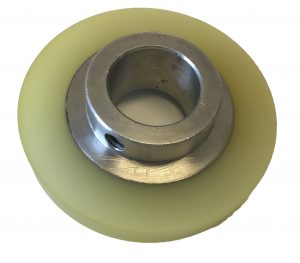Custom polyurethane feed rollers are cast in high volume as Plan Tech with rapid tool design and prototyping available. Each of the custom polyurethane feed rollers that we cast is to our customer’s specifications for unique applications or a lower cost OEM catalog feed roller reproduction.

Plan Tech also offers recoating services that include stripping of the old worn out urethane coating before entering our metal prep clean room. We also have an in-house machine shop ready to fabricate cores for custom polyurethane feed rollers of almost any size that can include a keyway or setscrew. Custom polyurethane feed rollers seem to be most popular in labeling of merchandise during production or assembly.
Our high-quality polyurethane formula is available in FDA applications as well as high abrasion feed rollers. Often times we hear how catalog feed rollers have a long turnaround with lower service life as an additional price due to being an OEM product. Plan Tech is able to provide inspection reports on request and hold tighter tolerance vs OEM feed rollers. Plan Tech also only buys high-quality material from world leading chemical companies. Specialty additives for custom polyurethane feed rollers are available to enhance physical properties of our urethane to tailor unique applications to add lubricity or tear resistance.
We manufacture utilizing many polyurethane techniques such as open cast molding is the simplest and most common molding method for thermoset polyurethanes. Advantages: Since pressures and temperatures in the molding process are relatively low (ambient pressure and temps below 250F), the molds are more cost-effective and can be made from a variety of materials including polyurethane. Opencast molding urethane parts is good for parts with relatively open tolerances on one surface. If tolerances are tighter, a secondary finishing operation is an option. Compression molding is when the part is split on a parting line, the halves are filled and the material is allowed to gel. The mold is then closed and placed into a compression press. Advantages: Compression molding yields a finished part with detail on all sides. Molds can be more expensive than those used in open casting or transfer, but parts can be quite detailed and elaborate.
Please Contact us for further details regarding custom polyurethane feed rollers!
